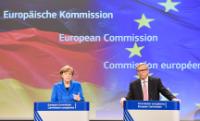German Chancellor Angela Merkel paid a one-day visit to Brussels on 4 March, and met with the European Commission President and the entire College of Commissioners. One wonders whether that would have happened if any of the other 27 EU member state leaders had been visiting. Of course, nobody doubts the prominence that Ms. Merkel has, because of the special weight that Germany carries in the European economy and politics, but also because of her own personality and leadership skills. This was a “Merkel week” for him, as Jean-Claude Juncker characteristically said, referring to additional talks he has had with the Chancellor in Berlin earlier in the week.
At a joint press conference with Mr. Juncker at the end of their meetings, Ms. Merkel referred to, among other things:
- The need for the agreement recently reached in the Eurogroup for Greece to be implemented within the four months of the extension given to the second Greek programme. Discussions about a third programme were premature and should be avoided. All sides should do their best to make the current programme succeed.
- Germany’s support for achieving the goal of concluding the transatlantic free trade agreement with the US (TTIP) by the end of 2015, at least the political part. Of course, Europe had to stand by its standards, but the agreement was very important for job creation in Europe.
- The two extra years given by the European Commission to France to comply with its Stability Pact obligations, while implementing an intensive reform programme geared towards the creation of an environment conducive to growth and job creation.
- The Commission’s investment plan, also known as “the Juncker plan”, which Ms. Merkel welcomed.
- Ms. Mogherini’s close involvement in handling the crisis in Ukraine. What was sought was the successful implementation of the Minsk package, reinforcement of the OSCE mission, implementation of the reform agenda within Ukraine. If Minsk did not work, member states and Commission were ready to move to tougher sanctions. Mr. Juncker contributed that he continued to be of the view that communications channels with Russia should remain open and used. But conditions were not in place to allow for a EU-Russia Summit this year.
Both Ms. Merkel and Mr. Juncker stressed that they work very well together to advance the common European agenda. Mr. Juncker specifically denied that there was any friction between him and the Chancellor, as had been reported in the press.


